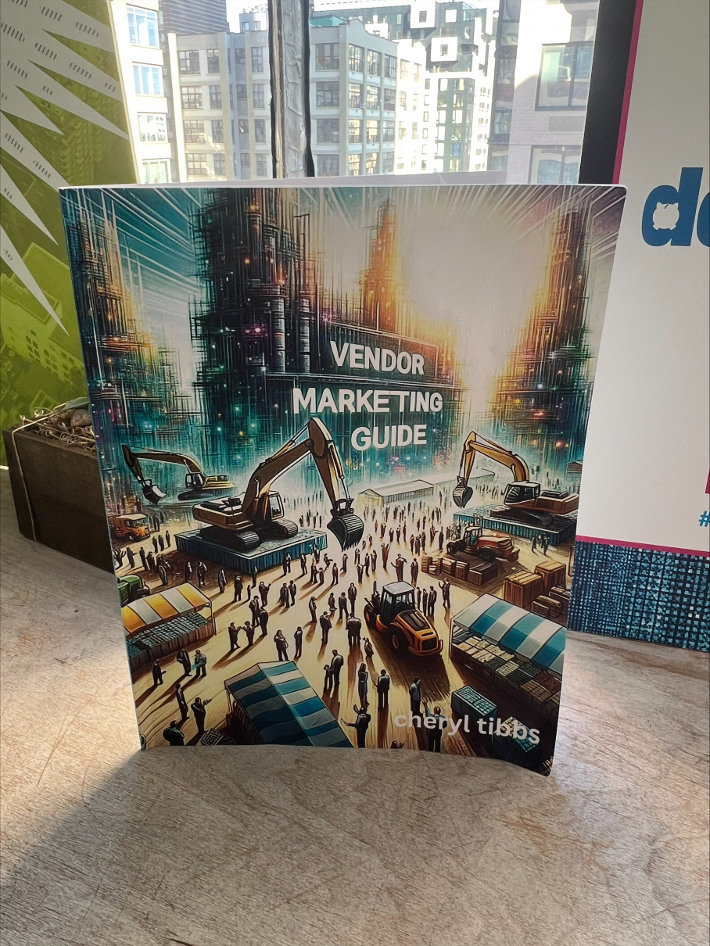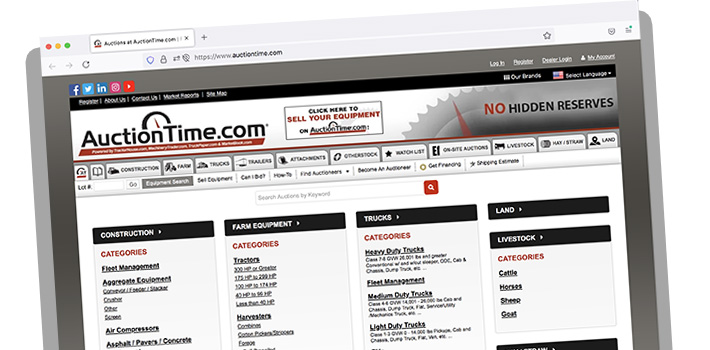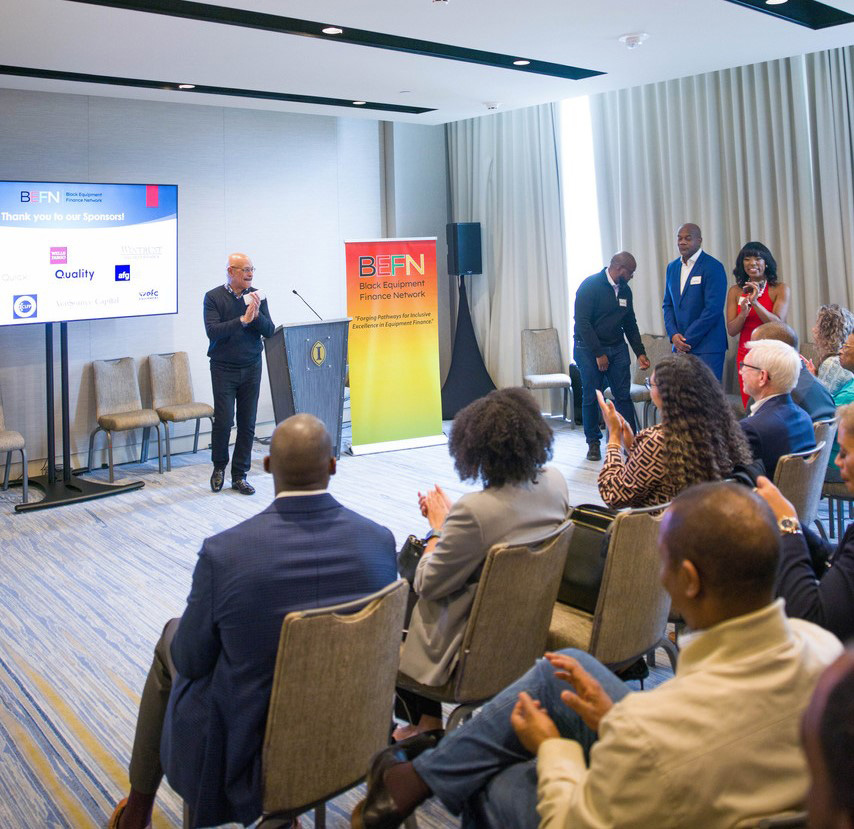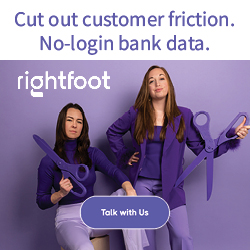Equipment Finance
Tips From Tibbs: Vendor Marketing Guide
November 6, 2023 The fine line between being successful and being stagnant in the equipment finance industry can easily be determined by vendor relationships. Cheryl Tibbs (CEO/Owner at Equipment Lease Co.), a veteran in the field, recently released her Vendor Marketing Guide this past October. The ten-chapter booklet covers various aspects, including vendor marketing, contact building, crafting value propositions, and more.
The fine line between being successful and being stagnant in the equipment finance industry can easily be determined by vendor relationships. Cheryl Tibbs (CEO/Owner at Equipment Lease Co.), a veteran in the field, recently released her Vendor Marketing Guide this past October. The ten-chapter booklet covers various aspects, including vendor marketing, contact building, crafting value propositions, and more.
Vendors are businesses authorized to sell equipment to end-users, Tibbs explains, and establishing a relationship with them can take a broker that is used to hunting for individual deals to instead being the recipient of multiple deals per week. But how to get that business is where most brokers get stuck.
“I think a lot of brokers get stuck with, ‘Well, how do I find vendors and what exactly is a vendor?’” she told deBanked. “I think that chapter three sticks out in particular, just making contact, knowing how to find a vendor, what to say when you get a vendor on the hook, and how to engage with that vendor.”
Tibbs said that brokers often assume that vendors already have a bank in-house when that is not always the case. This thinking might also lead them to shoot too low even when they do solicit them.
“A lot of equipment brokers they market to vendors and say, ‘Hey, send me the stuff that your people won’t finance’ and I think if you ask for trash, you’re going to get trash,” said Tibbs. If a relationship is built properly, a broker can get the vendor’s A-paper clients, she added.
Not only does the guide breakdown vendor relationships but also provides examples of how to pursue them, whether it be email, in-person, etc. The guide is not where education ends for brokers, however. Tibbs believes it’s an on-going learning experience.
“I think if you’re making money and you’re building these relationships, that’s motivation in and of itself, to continue to sharpen your knowledge with regard to this,” she said.
What’s Your Equipment Worth? They’ll Tell You
April 14, 2023 Sandhills Global, a publishing and technology conglomerate, has served as a central marketplace for selling heavy equipment since 1978. Often considered the auto trader of the industry, it primarily focuses on the sale of used machinery in the transportation, construction, and agriculture sectors.
Sandhills Global, a publishing and technology conglomerate, has served as a central marketplace for selling heavy equipment since 1978. Often considered the auto trader of the industry, it primarily focuses on the sale of used machinery in the transportation, construction, and agriculture sectors.
“Nearly every dealer in the country, be it a Caterpillar, Volvo, Peterbilt, or John Deere dealer, works with us because we’re the hub where they go to move their US machinery,” said Mitch Helman, Sales Manager at AuctionTime.
AuctionTime is one of many used-equipment marketplaces owned by Sandhills Global. Other popular Sandhills brands like AuctionTime include Machinery Trader, Tractor House, and Truck Paper.
“Virtually every wholesale buyer and dealer is our customer, allowing us to showcase their equipment to a wide range of potential buyers, including the average Joe or end user, who are typically found on Machinery Trader and Truck Paper. These buyers are the ones we want to reach, as they’ll often pay the most for the equipment,” explained Helman.
Sandhills strives to educate sellers on setting realistic prices for their equipment, helping them understand the retail value versus the auction value. Their value insight portal tool provides information on the specifics of the equipment, depending on its features and location, as location can greatly influence its worth.
“First and foremost, customers come to us to determine the market value and worth of their equipment. If they have a returned asset, we’re then able to connect them with different buyer bases, depending on the asset, to help them get the most money back in their pocket,” said Helman.
And those customers, it turns out, very often are drawn from Sandhills’ print publications.
“…It’s interesting because you hear print media is dead, there’s no need for print, all these newspapers are going away, but in our industry print has turned into like a physical search engine and it ultimately drives more traffic to the internet for people to look at more pictures, videos, specs and stuff like that,” said Helman. “And so, it’s still very relevant and vibrant in our spaces as of today.”
These publications can often be found at truck stops, tractor houses, and local convenience stores. Once a reader goes to a site like AuctionTime, the craigslist-style homepage (a tab says a new look is coming soon) will guide users to various live auctions or fixed-priced listings with photographs. A 2013 Hamm 3307 smooth drum roller located in Olney, Illinois, for example, is currently up for sale for $56,900. The listing has it all, including an integration to get shipping quotes and a button to apply for financing.
Ultimately, Helman explained that in a way the market depends on them to compile all this information to establish which way the market is going and what’s happening. “They love it,” he said. “Absolutely love it.”
Shaping Industry Experts With the CLFP
April 10, 2023 The CLFP (Certified Lease & Finance Professional) is a certification program for professionals in the equipment finance and leasing industry. The end-to-end course covers sales and marketing, credit, documentation, funding, and various accounting intricacies specific to the leasing and finance arena.
The CLFP (Certified Lease & Finance Professional) is a certification program for professionals in the equipment finance and leasing industry. The end-to-end course covers sales and marketing, credit, documentation, funding, and various accounting intricacies specific to the leasing and finance arena.
“It is a designation now that a lot of employers look fondly upon when they are trying to hire for positions because it indicates that the person who has the designation has basically gone through a very extensive process to learn everything about the industry as a whole…,” said Lia Wax, President of CLFP.
Within the last few years, COVID forced the academy to go virtual but has recently gone back to offering in-person classes in regions that span from the west coast to Philadelphia to Chicago and more. They have also launched an online self-paced option where a candidate can choose to do it at their leisure through a prerecorded self-paced product.
“Usually, the academies are hosted by somebody within the industry and then the company that’s hosting the ALFP (Academy for Lease & Finance Professionals) can decide whether or not they want it to be a private one for just their own employees or if they’re going to host the public one.”
The academy offers two options; a two-day option, which is two full eight-hour days of instruction and then we have a three-day option, which is four to four-and-a-half hours a day for three days. Between them both, they already have 12 courses scheduled up to June.
Once the course is completed, the academy maintains ongoing contact with students throughout the year, including an annual CLFP day.
People can also get together in various regions to network at different conferences. For example, the third day on NEFA’s agenda was closed by a CLFP toast to give those individuals the opportunity to discuss their journey in the industry with other members.
“I think the driving force here is to make sure that people in our industry are as educated and as informed as they possibly can be about the industry that we’re working in,” said Wax. “It’s great for somebody in sales or credit or accounting to know their facet of what they do, but I think the value-add for the foundation is we are able to provide education to applicants about all the different pieces that go into making up the industry and how it functions. And it helps us see the bigger picture.”
BEFN: A New Networking Space for Black Equipment Finance Professionals
March 30, 2023 “The event’s theme, ‘forging inclusive excellence in equipment finance,’ set the tone for the group’s mission to advance diversity, equity, and inclusion (DEI) in the industry,” said George Parker, Co-CEO at VenSource Capital LLC.
“The event’s theme, ‘forging inclusive excellence in equipment finance,’ set the tone for the group’s mission to advance diversity, equity, and inclusion (DEI) in the industry,” said George Parker, Co-CEO at VenSource Capital LLC.
Newly formed in January, the Black Equipment Finance Network (BEFN), is a non-profit organization focused on increasing the attendance of black professionals in the equipment finance industry. While providing network opportunities for people in the industry, the organization assists in promoting business collaboration, industry support and outreach, professional development, and Diversity, Equity and Inclusion (DEI) advocacy.
“I think the industry, given the mixer that we had last week in San Diego, is poised for [even more growth]. Many people showed up in support of what we’re looking to do,” said Lovern Gordon, National Sales Executive at Boston Financial & Equity Corp. “And that was a huge, huge, huge show of a vote of confidence that we’re headed in the right direction.”
The organization recently had their first inaugural mixer to kick off NEFA’s 4-day event, last week in San Diego. Filled with members and allies, the mixer dedicated a one-hour block to networking with people of color (POC).
“It was the most people that I and many others in the room have seen in terms of numbers for black people in the equipment finance industry in one space ever,” said Gordon.
For many POC, working in equipment finance can feel intimidating as the field is predominately a white-male led industry. The network is an all-around safe space for people that share in their likeness while being able to address issues of feeling left out of conversations or not feeling understood by their peers. The leadership team alongside Gordon (Secretary/Director), consists of George Park (President), Nancy Robles (Director), Kareem Jernigan (Treasurer/Director), Andre Olaofe (Director), and Eric McGriff (Director).
“This is a long overdue group of primarily black and people of color professionals in the equipment finance industry, that have just come together to form a small group within the industry to create an awareness of the black professional in the equipment finance industry,” said Andre Olaofe, President at Select Funding.
An active member of BEFN will typically attend monthly virtual meetings, have the option to be on panels, opportunity to come to regional and national events, advocate for laws and policies to improve within the industry, have access to the member directory, and mentorship.
“I’m on the steering committee,” said Cheryl Tibbs, CEO at Equipment Lease & Co. “The steering committee, we meet to set the agenda for the organization for our meetings. Just really to set the agenda for the group.”
The support from non-POC peers in the industry has been fantastic, Gordon explained. Several sponsors such as Dedicated Financial GBC, Wells Fargo Capital, North Mill Capital, and Wintrust Specialty Finance attended and donated, which contributed to pulling the mixer off. Tibbs noted the overwhelming response of non-black professionals that wanted to be involved who also saw a need for DEI within these organizations.
“The president of the National Equipment Finance Association, the board members of NEFA, the other members for funding sources, other brokers, all welcomed the group in San Diego, and came out to the mixer,” said Olaofe, “and were actively involved in at least sharing in the celebration of coming together and this inaugural mixer.”
Women Eye Opportunities in the Equipment Finance Industry
March 13, 2023 Coming into equipment finance around 2003, Reid Raykovich found that there were very few women in the field. Attending her first Captive and Vendor Finance conference through ELFA with 300 people, she realized she was only one of three women in the room. Fast forward to current day, Raykovich has seen a great influx of women come into the industry and she herself is now the CEO of the Certified Lease & Finance Professional (CLFP) Foundation, the organization that helps individuals in the industry achieve exceptional standards of professional conduct and technical expertise. She first attained that position in 2012 when she was only 34 years old. From there she has watched change come firsthand. Associations like NEFA, AACFB, and ELFA have also made efforts for women to be more involved and have a seat in leadership positions, according to Raykovich.
Coming into equipment finance around 2003, Reid Raykovich found that there were very few women in the field. Attending her first Captive and Vendor Finance conference through ELFA with 300 people, she realized she was only one of three women in the room. Fast forward to current day, Raykovich has seen a great influx of women come into the industry and she herself is now the CEO of the Certified Lease & Finance Professional (CLFP) Foundation, the organization that helps individuals in the industry achieve exceptional standards of professional conduct and technical expertise. She first attained that position in 2012 when she was only 34 years old. From there she has watched change come firsthand. Associations like NEFA, AACFB, and ELFA have also made efforts for women to be more involved and have a seat in leadership positions, according to Raykovich.
“I think that people are now aware that it’s not just having them work at a company, it’s giving them opportunities to go out, so the conference composition is no longer – to give the phrase ‘stale, male, and pale,’” Raykovich said. “It is changing and there’s certainly a lot more women…”
“Women just offer a unique value to the industry,” said Jena Morgan, COO at 360 Equipment Finance. When Morgan was first employed at a working capital provider, only 10% of employees were women. These days she’s a C-level exec for a well-known equipment finance company. Although she has gradually noticed more women being embedded into the industry, she still finds situations where she is the only woman at the executive table.
“A lot of times, I’ve seen women just spin off and start their own business, because they’re not able to move up how they want to,” said Morgan. “And so, I think sometimes that’s part of it, part of why you’re seeing more women in equipment finance is because they’ve spun off and just started their own business; and then they hire women.”
Like Morgan, Raykovich of the CLFP Foundation echoed the possibility of making a change if a ceiling has been reached.
“I think the best advice is if you’re at a company that’s not acknowledging your role as maybe a mother or a woman, move on to another company,” said Raykovich. “The amount of opportunities in this industry is just limitless. You can do any position, anything you want to do and you can find that in this industry if you do it well, you will never leave because you will have a name and people will want to hire you.”
In The Funding Biz? Here’s What to Know
March 9, 2023Are you in the biz of funding small biz? Listen to these execs tell you how to make it work!
Effective Broker Training
Successful Digital Marketing With Zack Fiddle
Measuring the Impact of Technology on Your Funding Business With Adam Schwartz
Building a Successful Funding Brokerage With Frankie DiAntonio
The Buck in Trucking
December 21, 2022 “If you don’t have the marketplace of lenders, yes, it can be problematic,” said Cheryl Tibbs, Owner/CEO at Equipment Lease Co about providing capital to the trucking industry. “If you don’t understand the trucking industry, it can be very problematic.”
“If you don’t have the marketplace of lenders, yes, it can be problematic,” said Cheryl Tibbs, Owner/CEO at Equipment Lease Co about providing capital to the trucking industry. “If you don’t understand the trucking industry, it can be very problematic.”
In the last year, there has been an increasing interest in equipment financing. It was the primary topic of a panel discussion at Broker Fair and the subject of several sidebar conversations throughout the day and thereafter. For Tibbs, who lives and breathes equipment finance and trucking, she said she doesn’t see funding in that space slowing down.
“Every business that’s in business needs some type of equipment to operate,” said Tibbs. “Whether it’s a cell phone, a POS system, a car or truck, excavator, whatever it is, every business has some type of equipment. So I don’t see the industry slowing down at all.”
Tibbs, for her part, says that some companies in her lender network can provide a uniquely beneficial solution, a funding bundle that is part equipment finance and part working capital.
“Some of those customers may need that working capital for a down payment or if you’re buying a truck, for instance,” Tibbs said. “And this working capital comes in handy because if you know anything about trucking, the insurance on those things can be– I’ve seen it go as high as 60,000 a year, almost half the cost of a truck. So that working capital comes in handy.”
And the costs of trucks is in a state of flux. Jonathan Nelson, General Counsel at Dedicated Financial GBC, said the costs of used trucks is rapidly shifting.
“This month, you could get $20,000 for this particular used truck on the East Coast and next month, if you were to sell it on the West Coast, you might get $40,000,” said Nelson. “It’s very volatile at the moment.”
Evan Sowa, Senior Finance Manager at Everlasting Capital, echoed same.
“Depending on the geographical market, prices on the same truck can vary substantially,” he said. “Market prices are as high as I have ever seen them, up to 80% higher than similar units 4 years ago.”
Sowa continued by explaining that demand and prices in the used truck market have been booming but that they’re finally starting to cool off.
David Lee, CEO at North Mill Equipment Finance, said there are some issues in the wider trucking market right now.
“The trucking industry is facing a lot of challenges currently,” Lee said. “In addition to supply disruptions, and an inflation in used asset values and unavailability of newly manufactured equipment combined with significant increases in diesel fuel costs, a number of operators have felt tremendous margin pressure, with load rates having decreased, the cost of the equipment being higher, and the cost of operating the equipment via fuel being higher.”
 A lot of those costs have not been able to be passed on to shippers, Lee added, and he said that they’re seeing a material increase in delinquencies and defaults amongst trucking operators.
A lot of those costs have not been able to be passed on to shippers, Lee added, and he said that they’re seeing a material increase in delinquencies and defaults amongst trucking operators.
Nelson at Dedicated, speaking on a much broader level of equipment finance, said that in general the industry has been able to escape the wave of defaults happening in other industries.
“We are a part of the National Equipment Finance Association and the Equipment Leasing and Finance Association to make sure that we understand issues and different trends that are happening in the equipment finance industry, because that’s where most of our clients are,” he said.
Tibbs, who’s a super broker, explained that she has seen lenders and funders tighten up their guidelines post covid.
“It’s not as easy to get plugged in with certain lenders,” she said. “It’s not as easy to get certain deals approved that we probably could have gotten approved pre-pandemic.”
Because of her experience and relationships, however, Tibbs is optimistic about the kind of deals she can get done, especially over newcomers who are at a disadvantage, explaining that she can finance pretty much anybody.
Evan Sowa at Everlasting summed up the state of things as such.
“Still funding trucks every day but the market is crazy right now,” he said.





























